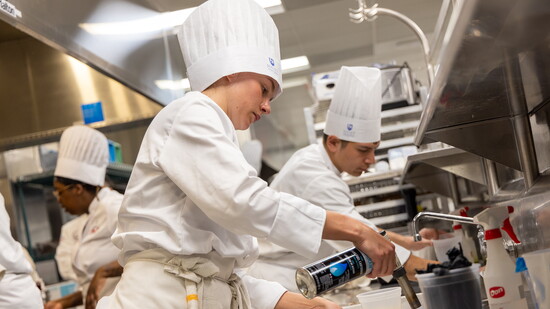On a crisp fall evening in a cozy Mokena kitchen, laughter bounces off the walls as strangers become fast friends, flour-dusted hands shaping gnocchi with quiet pride. Down the road, a middle schooler dices onions in her own kitchen, guided by a warm voice over Zoom. And in downtown Joliet, student chefs in crisp white coats prep for a dinner service that mirrors the pace and pressure of a real restaurant kitchen. In a quiet space not far away, a woman sits with a client, mapping symptoms to root causes: gut health, hormones, blood sugar.
In different kitchens, with different learners, a shared belief unites them: food is more than fuel. It’s knowledge. It’s culture. It’s connection.
At Axis Nutrition in New Lenox, founder Tarah Hoffmann takes a functional approach to wellness. A former clinical dietitian turned nutritionist, she helps clients understand how food can restore balance to their unique biochemistry. “Nutrition is a tool for healing,” she says. “It’s not just about eating healthy; it’s about creating a personalized plan to help people feel like themselves again.”
Tarah emphasizes the power of cooking at home. “Preparing your food gives you control and reconnects you with nourishment as an act of care,” she explains. Her simple advice? Balance meals with protein, fiber, color, and healthy fats, and start with easy recipes like grain bowls and smoothies. She believes education empowers clients to navigate food choices confidently and sustainably.
Across the region, Kristyn Slick of Classroom Kitchen champions mealtime as a space for family connection. After stepping away from teaching to focus on her children, Kristyn rediscovered the joy of cooking together. Her programs teach families how to share meals and build traditions, even amid busy schedules.
“Food is a shared language,” Kristyn says. “When we cook and eat together, we share ourselves.” Her classes, whether virtual or in person, focus on fun, simple recipes and encourage screen-free family nights. She’s seen kids gain independence in the kitchen and families bond over pizza nights, grain bowls, and homemade monkey bread.
Adding a fresh, vibrant layer to the local culinary scene is Farmhouse Academy, founded in 2019 with locations in Mokena and Crest Hill. Chef Julianna DiGuido joined shortly after its launch, bringing her passion for hands-on learning and home cooking.
“I was drawn to sharing what I’d learned in culinary school with everyday cooks,” Julianna explains. “Farmhouse is unique because anyone, no matter skill level, can come and make the entire menu themselves, from start to finish.”
Julianna’s classes cover a wide range of cuisines and techniques, from Thai dishes to roasting whole chickens, always emphasizing confidence and enjoyment. “My favorite moment is seeing people’s pride when they create something new,” she shares.
Fall is a special time at Farmhouse Academy, with seasonal classes featuring sweet potato gnocchi with brown butter sage sauce, pumpkin risotto, Halloween treats, and Thanksgiving prep. “We love incorporating local produce and cozy flavors,” Julianna says.
Beyond cooking skills, Julianna sees her classes as a place for connection. “People often arrive as strangers and leave as friends. Cooking together creates community around delicious food.”
The Academy’s diverse offerings include classes for kids learning essential life skills, teens building independence, and adults refining their home cooking. Looking ahead, Farmhouse plans to expand with new classes on sourdough bread baking, classic farmhouse meals, and holiday favorites.
In downtown Joliet, Joliet Junior College’s Culinary Arts Program equips students for professional kitchens with rigorous training and real-world experience. Students learn everything from knife skills to kitchen management and sanitation under culinary arts program director Chef Mike McGreal’s guidance.
Two student-run restaurants, Thrive and Saveur, open to the public, serve scratch-made, seasonal menus. Each semester’s new cohort trains quickly to take over, building teamwork and adaptability.
“Our goal is to develop not just cooking skills, but leadership and critical thinking,” Mike says. “The industry demands passion and hard work, and our students are prepared to succeed.”
The program’s faculty includes nationally recognized chefs like Certified Master Chef Tim Bucci and Pastry Chef Andy Chlebana. Graduates contribute to the culinary scene locally and worldwide.
Whether a child gains confidence at the stove, a family revives mealtime traditions, or a student masters a complex dish, kitchens are places of transformation. In homes, classrooms, and restaurants across the area, one lesson rings clear: when we gather around food, whether to learn, cook, or share, we nourish more than our bodies. We feed community, creativity, and the heart of what it means to be human.
“Food is more than fuel. It’s knowledge, culture, and connection.” Tarah Hoffman
